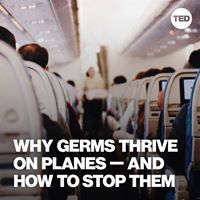Apr 10, 2020
Why Germs Thrive on Planes — and How to Stop Them
Posted by Kelvin Dafiaghor in category: biotech/medical
Here’s how a sneeze travels inside a plane cabin.
Watch Raymond Wang’s full TED Talk here: http://t.ted.com/oa2OEWB

Here’s how a sneeze travels inside a plane cabin.
Watch Raymond Wang’s full TED Talk here: http://t.ted.com/oa2OEWB
The COVID-19 pandemic has put an incredible strain on global supply chains, from medical supplies to household goods, as spikes in demand stress-test logistics infrastructures. There is an opportunity for unmanned delivery vehicles to assist in addressing this demand and help to reduce the risk of spreading infection.
Here’s a look at some of the challenges and opportunities for automated vehicles (AVs) in last-mile deliveries and local logistics.
Researchers from Kumamoto University have found that Melinjo seed extracts may help to improve diabetes and obesity by stimulating the production of adiponectin which is a hormone that works to help improve both conditions; individual genotype differences were also discovered that were responsible for variations in its efficacy.
Melinjo fruit contain high levels of antioxidant and antibacterial properties as well as high levels of polyphenols such as resveratrol that has been shown to induce adiponectin and may help to improve lifestyle related diseases such as metabolic syndrome. A type of resveratrol called Gnetin C which is found in MSE has higher antioxidant activity and has been shown to stay in the blood longer than resveratrol, but the exact mechanisms of how they exert their biological activity remains unknown.
Genetic analysis was used to find that differences in the type of DsbA-L gene affects adiponectin activation; meaning that DsbA-L induction may promote adiponectin activation and help to improve lifestyle related diseases. Their recent research has attempted to determine whether MSE enhances the function of DsbA-L; whether MSE promotes adi[onectin activation; and whether MSE has a therapeutic effect on either obesity and diabetes.

Los vigilantes del parque Xixi Wetland de Hangzhou (China) emplean gafas de realidad aumentada que les permiten detectar qué personas tienen fiebre desde una distancia segura para minimizar los contagios de covid-19.
Suscríbete a nuestro canal de eventos en vivo: https://www.youtube.com/channel/UCEIhICHOQOonjE6V0SLdrHQ
The world is facing a global shortage of ventilators, and companies including GE and Ford have shifted production over to making more.
What is a safe distance when running, biking and walking during COVID-19 times? It is further than the typical 1–2 meter as prescribed in different countries!
In a lot of countries walking, biking and jogging are welcome activities in these times of COVID-19. However, it is important to note that you need to avoid each other’s slipstream when doing these activities. This comes out of the result of a study by the KU Leuven (Belgium) and TU Eindhoven (Netherlands).
The typical social distancing rule which many countries apply between 1–2 meters seems effective when you are standing still inside or even outside with low wind. But when you go for a walk, run or bike ride you better be more careful. When someone during a run breathes, sneezes or coughs, those particles stay behind in the air. The person running behind you in the so-called slip-stream goes through this cloud of droplets.
👏Europe’s largest economy is looking to make its post-virus recovery compatible with its ambition of becoming carbon-neutral by 2050.
The EU has similarly pledged to make its stimulus plan aligned with its climate commitments.
Germany’s green energy shift may get a financial shot in the arm when the impact of the coronavirus ebbs, according to a senior member of Chancellor Angela Merkel’s cabinet.
Continue reading “Germany Touts Green Stimulus in Post Covid-19 Policy Push” »
The Kenyan factory has achieved a great milestone through its ability to make 30,000 surgical masks daily which is a major turnaround from its initial garment making business. I am glad in the stimulus package money will be given to small business to make things needed to fight coronavirus instead of sourcing them outside. The economic investment will help the economy just as Clinton invested in small businesses.
An Israeli scientist is urging people to ask a simple question daily to save lives from coronavirus: can I smell? There is widespread confusion about how to identify coronavirus symptoms, as several of them are similar to symptoms of flu and the common cold. But Noam Sobel says that there is one highly unusual pattern, a sudden inability to smell, and he has built a website to help people keep tabs on their odor-assessing abilities. People are signing up from all over the world, at an average rate of 200 per hour.
Smell garlic and toothpaste and save lives from coronavirus: It’s not a folk cure, but a Weizmann Institute initiative, and 200 people an hour are joining.
